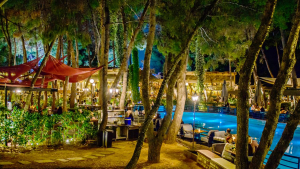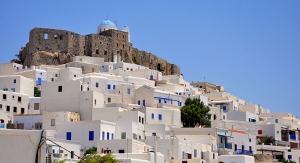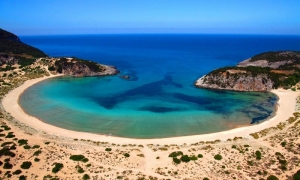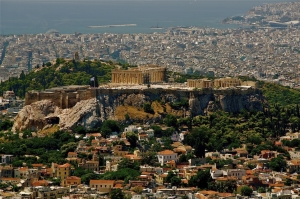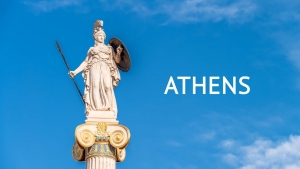LIFE & CULTURE
XpatAthens
How British Expats Can Vote In The UK EU Referendum
To vote 'yes' or 'no' is important for many people, including British citizens living overseas. Here are just a few important facts about the referendum and information on how to vote!
- An estimated 5.6 million British citizens overseas
- Since 1985, anyone over 18 who has lived abroad for less than 15 years is eligible to vote in British parliamentary and European elections
- British citizens living abroad for more than 15 years are automatically disenfranchised.
For more information about the UK's EU referendum, please visit: BBC News
For more information on how to vote as a British expat, please visit: Euro News
Idyllic Corfu Village Steals The Limelight In New BBC Drama
Great Bars To Visit In Athens' Northern Suburbs
Here are some cool places to enjoy a leisurely drink when visiting one of Athens' northern neighborhoods.
The Dalliance House
Located in a wonderful neoclassical house in Kifissia, the Dalliance House has wonderful deco, reminding you of a stylish, cozy living room. It is open from 10 in the morning until late at night for an all-day experience. During the afternoon, the restaurant offers Mediterranean recipes and when it's time for a drink, you will find tasteful cocktails and a large variety of malts, beers, and wines.
Address: Kyriazi 19, Kifissia
Telephone: 210 6230775
The Paliatsos Cafe/Wine Bar has been a good reason to visit Penteli over the past few years. It is an elegant and warm place that has a vintage style with old furniture and comfortable sofas to unwind and enjoy your coffee while listening to relaxing melodies.
Address: Vasileos Georgiou B' & Souvaliotou, Penteli
Telephone: 210 8100889
Piu Verde
This is a classic and favorite spot inside the Alsos of Papagou. With high pine trees, a lovely water fountain, and an artificial lake, Piu Verde gives you the impression of a house in the woods. The relaxing atmosphere and the breathtaking scenery are just what you need to enjoy your coffee, meal, or drink. The bar offers excellent cocktails and the DJ's soundtracks enhance the lovely ambiance.
Address: Strat. Al. Papagou & 8th Merarxias, Alsos Papagou
Telephone: 210 6546185
33m2
We would say this bar is a trademark of Vrilission square. It has a friendly atmosphere and a relaxing style. In the morning, the bar serves fresh ground coffee, while, at night, the colorful cocktails hold the customers' interest. One of the bar's highlights is the wine list, which includes labels from Greek and foreign vineyards.
Address: Plateia Analipseos 4, Vrilissi
Telephone: 2106821033
Mr Peacock
Address: Katsoulieri 7, Halandri
Telephone: 21 0680 0390
Best Low Budget Summer Destinations In Greece
To read this article in full and to see more of the best low budget destinations, please visit: Hip Greece
Lonely Planet Names Peloponnese Top European Destination In 2016
To see this article in full and the rest of the 'Best In Europe' list, please visit: Lonely Planet
Press Event Held In Athens For Santorini Experience
The first announcement for the great organization of sports tourism “Santorini Experience” was held on Wednesday, May 18, 2016, with cinematic way at the Gold Class halls of Village Cinemas at The Mall Athens.
The event's program included two parallel screenings of the event’s video - documentary from the previous year (as was shown in more than 1.6 million households in Greece and abroad), to reporters and senior executives, as well as greetings from ambassadors and representatives of the organization.
During the event, this year’s activities of “Santorini Experience”, which include swimming and running, were presented for the first time, along with their ambassadors and coefficients. It was also announced that the organization has been placed under the auspices of the Hellenic Swimming Federation (KOE), which happens for the first time in open water swimming competition in a sports tourism event, highlighting the importance and solemnity of “Santorini Experience”, not only in Greece but also internationally. The element of extroversion and international promotion was credited also to one more “surprise” - cooperation that was yet to be revealed.
TV channel FOX Sports of FOX Networks Group, one of the biggest sports television networks in the world in subscriber base, distribution and promotion of sport content, undertakes this year as Official Broadcaster the broadcasting of the sports documentary “Santorini Experience”. The sports documentary will carry forward unique images of sports tourism in Santorini, to millions of homes in Europe, Asia and Africa through the vast television network of FOX Sports.
This year's event program includes open water swimming from the volcano to the old port of Fira. The swimming route has been designed by the Federal Technical coach of Swimming, with Olympic and World medals in open water swimming Nikos Gemelos, who will be the Technical Director of the event in swimming, while great names of our national team, such as Olympic and World Champion in open water swimming, Spyros Gianniotis and World Champion in open water swimming, Kelly Araouzou, along with a variety of leading open water swimming athletes like Antonis Fokaidis, Giorgos Arniakos and Dimitris Negris will take part in this year “Santorini Experience”.
Respectively, various running routes will be held at the magical path that connects Oia with Fira overlooking the Caldera. This year’ s routes have been selected by the former marathon runner, holder of national best performance on the classical route, running coach, manager of All About Running and technical director of the event in running, Nikos Polias. At the end of the press event, the Mayor of Santorini Anastasios Nikolaos-Zorzos said: “Last year we started Santorini Experience. A sports event that is becoming an institution for the island. “Santorini Experience” gives visitors the opportunity to combine wellness with the unique nature of the island, to live an “explosive” experience. Santorini Municipality and the Athletic Organization DAPPOS embraced and supported this event from the first time, thus trying to highlight another face of the island, the athletic side. We welcome you to the organization and wish that you live a truly unique life experience”.
On his part, the President of the Municipal Sports Cultural Environmental Organization of Santorini (D.A.P.P.O.S.) Mr. Eleftherios Tzouros said: “The journey that began last year in May 2015 continues. A journey where man and nature become one with respect and love. The idea of Santorini Experience is unique and unprecedented, since participants are invited to compete on the Caldera of Santorini (Land & Sea), with invisible spectator the Atlantis which many researchers speculate that sank in the sea of the caldera area. This “marriage” of nature - human and culture is a unique experience that we expect you to live”.
The President of the Hellenic Swimming Federation (KOE), Mr. Dimitris Diathesopoulos said: “After last year's successful hosting of the Open Water race of “Santorini Experience”, at beautiful Santorini, with the participation of leading distinguished members of the national team, but also with the presence of the President of the Swimming Federation, and after relevant conversations between the Mayor of Santorini and representative bodies of the organization, it was a mutual understanding that this great event will be implemented for the second consecutive year. This time it has been placed under the auspices of the Hellenic Swimming Federation. Something that signifies the importance and solemnity, not only in Greece but also internationally. Both I personally as president and KOE, we believe that this year we will have successfully organized a large organizational and participatory event and this will mark its establishment in a national and international level as one of the most important events in the Open Water area. I wish good luck to those who curated the event, expressing the assurance that KOE will be standing close to this effort, aiming to become one of the most important events in our field with a long perspective and massiveness in participations”.
Finally, the CEO of Active Media Group, Mr. Akis Tsolis said among other: “Municipality of Santorini, D.A.P.P.O.S., KOE, local companies of the island and a top global television network join together to promote swimming, running, in a unique Greek landscape like that of Santorini. The announcements of this day are quite significant and a milestone for sports tourism in Greece. The assistance of the Hellenic Swimming Federation and the broadcasting of the complete documentary (rather than just highlights), by FOX Networks Group, to more than 40 million households, indicatively to countries like China, India, South Korea, Turkey, Israel, South Africa and many others, and in continents such as Europe, Asia and Africa, make me really happy that we managed in such difficult times to unite all our forces for an innovative organization like Santorini Experience. We do not rest on what tourism achieves today, but we continue to build for tomorrow”.
“Santorini Experience” is a collaboration between the Municipality of Santorini, the Municipal Sports Cultural Environmental Organization of Santorini (D.A.P.P.O.S.) and Active Media Group.
Sponsor: Alafouzos Sport
Supporter: Village Cinemas
Official Broadcaster: FOX Sports
Hospitality Sponsors: Athina Luxury Suites, Central Fira Hotel, Sienna Residencies, Memories Hotel, Loizos Stylish Residencies
Under the auspices of the Hellenic Swimming Federation (K.O.E.).
For more information, please visit: Official Santorini Experience Website
TripAdvisor Lists Acropolis Among World's Best Landmarks
To view the full list of the 2016 Traveler's Choice Awards for Best Landmarks, please visit: TripAdvisor
Music From The Movie 'Ouzeri Tsitsanis'
To read this article in full, please visit: OMILO
Athens - A Time Lapse Video
Rekdal's work has been used by popular brands and media outlets such as BBC, National Geographic, NBC, Sony, Rolls Royce, and Icelandair.
'Athens' was made in 2015 on behalf of VisitGreece and the Greek National Tourism Organisation.
To view more of Stian Rekdal's videos, please visit: Vimeo
Terms of Payment
Some of the services offered by XpatAthens have a fee associated. The services that require payment are as outlined below. Prices for these services can be found here.
- a) Listing a business or service in our Directory.
- b) Listing a property in Accommodation.
- c) Listing events, courses, workshops, or tour experiences in What’s On.
- d) Listing items in our Classifieds.
- e) Listing products in our eshop (not yet available).
For your convenience, in order to pay for the above services, XpatAthens has partnered with Viva Payments for secure online payment.
Viva Payments Services SA is a licensed e-money institution for operations in the EEA-31 region by the Bank of Greece. Viva Payments ensures speed, quality and security for every transaction. The modes of payment available on XpatAthens via Viva Payments are as outlined below. Note, you are not required to have an account with Viva Payments in order to complete a transaction on XpatAthens.
The following methods of payment are available:
- Credit Card. Having requested to make payment by credit card, once redirected to Viva Payments’ secure payment page insert the necessary data. Once you have submitted the payment, you will receive an email from Viva Payments confirming the transaction.
- Bank Transfer. Having requested to make payment by bank transfer, once redirected to Viva Payments’ secure payment page insert the necessary data. Once you have submitted the payment, you will receive an email from Viva Payments confirming the transaction.
- Viva Wallet. This payment method requires that you have an active Viva Wallet account. Having requested to make payment via Viva Wallet, the funds will be transferred from wallet to wallet.
If you prefer to make payment directly to XpatAthens (you do not want to use the secure online payment provided by Viva Payments) please send us an email to admin@xpatathens.com outlining the services you are interested in paying for and we will provide you with an alternative payment method.
Important Additional Information:
- All of the Euro amounts outlined on the applicable submission pages of each service (directory listing, event post, etc) include the applicable 24% VAT.
- The requested service (directory listing, event post, etc) will be available online at www.xpatathens.com only once full payment has been confirmed. You will receive an email from XpatAthens once your submission is online.
- In accordance with Law 2251/1994 on Consumer Protection, as amended and currently in force, the customer has the right of withdrawal from the transaction without justification within 14 days. We ask that you inform us of your request for refund by email at admin@xpatathens.com.
- XpatAthens is registered in Greece. For complete company details, please email the request to info@xpatathens.com.



